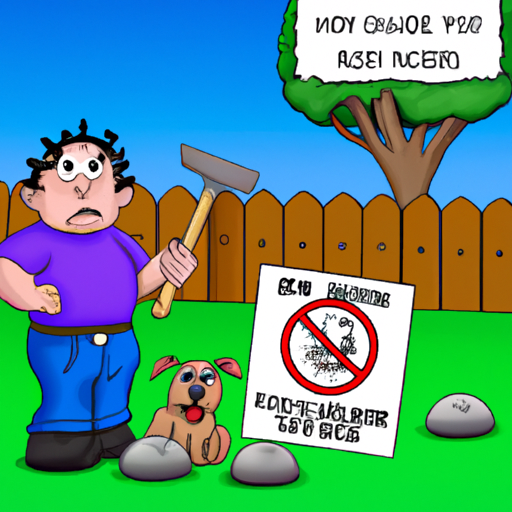As a caregiver to your beloved canine companion, you’ve likely experienced the frustration of finding your once pristine yard turned into a moonlike landscape of craters courtesy of your dog’s incessant digging. It’s a problem faced by many dog owners and it raises the question: what stops dogs from digging?
In this article, we’ll delve into the reasons why dogs love to dig, and practical ways you can deter this behavior. We’ll also address common questions about dog digging in our FAQ section.
Why Dogs Dig
Understanding why your dog is digging is the first step to stopping it. Dogs dig for various reasons, each with its unique solution.
- Boredom: Dogs that are left alone without toys or companionship can resort to digging as a form of entertainment.
- Hunting Instinct: Some breeds have a strong instinct to dig for prey. This can be triggered by the smell or sound of underground critters.
- Comfort and Protection: Dogs may dig to create a cool spot to lie in during hot weather or to hide food or objects.
- Escape: If your dog is trying to get to something or somewhere, it might dig under the fence to escape.
- Attention-Seeking: In some cases, dogs dig to get attention. Even negative attention like scolding can reinforce the behavior.
Knowing the root cause for your dog’s digging will help you tailor a solution that will effectively deter them.
How to Prevent Dog Digging
Now that you understand why your dog might be digging, let’s explore some preventative measures.
Provide Enough Exercise and Mental Stimulation
A tired dog is a good dog. Keeping your dog physically exercised and mentally stimulated can help prevent digging due to boredom or excess energy.
- Daily walks and play sessions.
- Training exercises or dog sports.
- Interactive toys and puzzle feeders.
Create a Digging Zone
If your dog’s instinct to dig is strong, consider creating a designated area for them to exercise this instinct without destroying your garden.
- Choose a spot in your yard for their digging zone.
- Make it attractive by burying toys or treats.
- Encourage them to dig in this area and reward them for doing so.
Train and Reinforce
Training your dog to understand what is off-limits can also be effective.
- Use commands like “leave it” when you catch them digging.
- Reward them for obedience.
- Be consistent and patient with your training.
Protect your Garden
If your dog is drawn to your garden, consider ways to protect it.
- Use fences or barriers to keep them out.
- Plant dog-repelling plants like rue or citrus.
Addressing Specific Digging Issues
Some digging problems may require more specific solutions.
For Hunting Dogs
If your dog is digging due to their hunting instinct, try these tactics:
- Regular pest control to reduce the appeal of your yard as a hunting ground.
- Provide alternative outlets for their hunting instinct like toys that move or make noise.
For Escape Artists
If your dog is digging to escape, consider these actions:
- Install dig-proof fencing or bury chicken wire at the base of your fence.
- Don’t leave them unattended in the yard if they’re prone to escape attempts.
FAQ
Here are answers to some common questions about dogs and digging.
Why does my dog dig holes and then sit in them?
Dogs often dig holes to lie in as a way to cool off. The earth is cooler a few inches below the surface and can provide relief on hot days.
What can I put on my lawn to stop my dog from digging?
There are a number of commercial products available that deter dogs from digging. These are usually non-toxic sprays that have a smell dogs dislike.
Are there any breeds that are more prone to digging?
Yes, some breeds such as Terriers, Dachshunds, and Beagles are more prone to digging due to their hunting backgrounds.
Is it ever okay to let my dog dig?
Yes, if the digging is not causing harm or destruction, it can be an acceptable form of physical and mental exercise for dogs.
Why has my older dog suddenly started digging?
Sudden changes in behavior can be a sign of stress or health issues. If your older dog has suddenly started digging, it may be worth a visit to the vet to rule out any underlying issues.
Understanding why your dog digs and using these strategies can help keep your garden intact and your furry friend happily occupied. Remember, every dog is unique and what works for one may not work for another. Patience, consistency, and understanding are key. Happy gardening!



